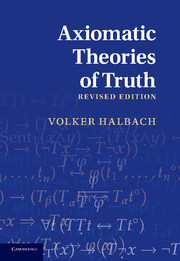23 - Ontological reduction
from Part IV - Ways to the truth
Published online by Cambridge University Press: 05 February 2015
Summary
Proof-theoretic reductions of various kinds are often seen as ontological reductions. For instance, the observation that Peano arithmetic is relatively interpretable in (and also reducible in other senses to) Zermelo–Fraenkel set theory is taken by many philosophers to be a reduction of numbers to sets.
Here I will only touch upon some of the issues raised by the results about axiomatic truth theories in this book and will not enter into a general discussion about ontological reduction (but see Bonevac 1982; Feferman 1998; Hofweber 2000; Niebergall 2000 for further discussion). I will proceed under the assumption that ontological commitments to numbers, sets, and other abstract objects are made by accepting theories about those objects. So, for instance, one makes an ontological commitment to numbers by accepting a theory such as Peano arithmetic. This assumption is far from unproblematic, but here I do not attempt to justify it as the general theory of ontological commitment goes far beyond the scope of this book.
If proof-theoretic reductions can be understood as ontological reductions, then in particular proof-theoretic reductions of mathematical theories to truth theories can be seen as such. An example is Theorem 8.35, which shows that the theory ACA of sets of natural numbers which are arithmetically definable (with second-order parameters) is reducible to the compositional theory CT of truth.
- Type
- Chapter
- Information
- Axiomatic Theories of Truth , pp. 316 - 318Publisher: Cambridge University PressPrint publication year: 2014



